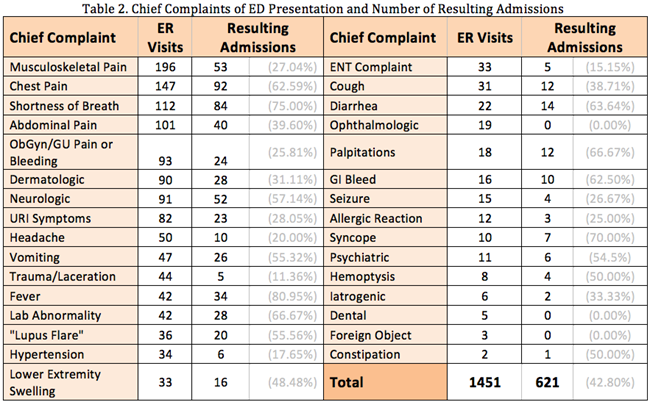Session Information
Session Type: ACR Poster Session C
Session Time: 9:00AM-11:00AM
Background/Purpose:
SLE patients frequently utilize the Emergency Department (ED), impacting the cost of care and quality of life. We performed a retrospective analysis of ED visits over a 5.5 year period among SLE patients from an urban, underserved population. Aims were to: 1) define most common complaints 2) examine sociodemographic statistics 3) analyze most common complaints resulting in admission.
Methods:
Charts of patients who met ACR criteria for SLE presenting to the ED or Rheumatology clinic between 1/1/2010 and 6/20/2015 were reviewed for demographics, chief complaint, and ED course. In evaluating level of admissions over the 5.5 year period, patients were classified as Non-users (no ED visits, only clinic visits), Occasional Users (1-5 ED visits) or Frequent Users (>5 visits). Excluded charts were those for pediatrics, medication refills, social work needs, and those for the dialysis or renal transplant services.
Results:
Of an initial cohort of 363 patients and 1700 ED visits, 359 patients were reviewed. 258 patients (72%) had ≥1 visits with a total of 1451 ED visits (range 1-72). Patient demographics are shown in Table 1, with mean age at ED visit of 39.4 years with 31 men, 328 women. The mean number of visits was 6.24 ± 6.40 (±SEM) with 44% of all patients as Occasional Users. Shown in Table 2, most visits were related to musculoskeletal pain (MSK) in 196 patients(13.5%), chest pain in 147(10.1%), and shortness of breath (SOB) in 112(7.7%). The most common complaints to prompt hospital admission were fever(80.9%), SOB(75.0%), and syncope(70.0%). 62.3% of chest pain complaints led to admission compared to 27.0% of MSK. Only 36 visits(2.5%) were recorded as complaining of lupus flare, with resulting admissions in 55.6%.
Conclusion:
We present an analysis of characteristics of ED presentation and rate of resulting admissions of SLE patients. Physicians should be aware that the average SLE patients will present to the ED roughly yearly. Unnecessary ED visits of SLE patients can be avoided with patient education and outpatient symptomatic control for the most common complaints.
To cite this abstract in AMA style:
Levinson J, Savjani M, Zisa D, Ginzler EM. Characterization of Emergency Department Visits in an Urban Underserved Lupus Cohort [abstract]. Arthritis Rheumatol. 2017; 69 (suppl 10). https://acrabstracts.org/abstract/characterization-of-emergency-department-visits-in-an-urban-underserved-lupus-cohort/. Accessed .« Back to 2017 ACR/ARHP Annual Meeting
ACR Meeting Abstracts - https://acrabstracts.org/abstract/characterization-of-emergency-department-visits-in-an-urban-underserved-lupus-cohort/


